Although Catholics who refuse to join the Patriotic Church bear the brunt of persecution, state-run venues are also increasingly abused.
by Shen Xinran
Throughout this year, the CCP government ramped up attacks against Catholics, refusing to join the Chinese Patriotic Catholic Association (CPCA), ahead of the Vatican-China Deal of 2018 renewal in late October.
The northern province of Hebei, China’s Catholic heartland, has been one of the primary targets of this persecution.
On May 31, the Jiehedian township government in Handan city shut down an unregistered Catholic church and threw most of its belongings into trash.
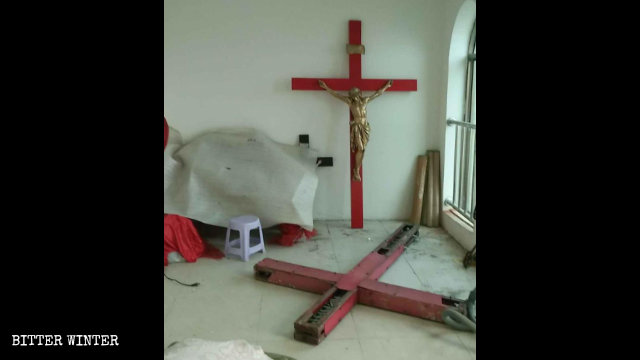
A month earlier, on April 28, crosses, religious images, and the podium were removed from an unregistered Catholic church in Xingdi village in Handan’s Jize county. Villagers told Bitter Winter that the operation started at about 1 a.m. after the electricity supply to half of the village had been cut off, and roads leading to it were blocked to stop believers from surrounding villages who were coming to help protect the church. Personnel guarded the doors of the residences around the church, prohibiting people from leaving their homes. Churchgoers put up a new cross the next day, but officials removed it again, threatening to demolish the church if the cross was reinstalled.
An unregistered Catholic venue in Hebei’s Shijiazhuang city was ordered to stop holding gatherings in August. The sign “Consolation of the Afflicted” on the lintel above the venue’s door was replaced with “Harmony in a Family Makes Everything Successful.” The slogan “Jesus Good Shepherd Picture” on the wall was hidden behind a landscape painting.
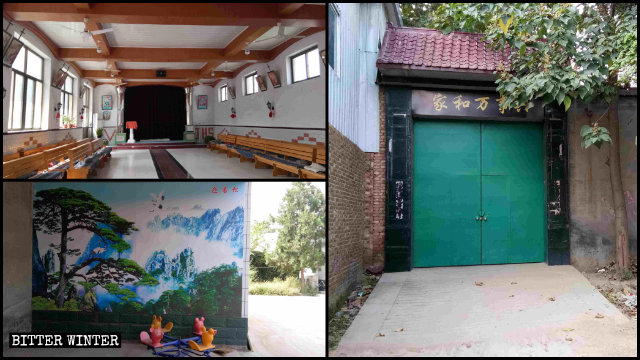
In July, after cutting off the electric supply to an unregistered Catholic meeting venue in Shijiazhuang city, municipal government personnel removed the venue’s cross, and deleted the footage of the demolition from onlookers’ phones.
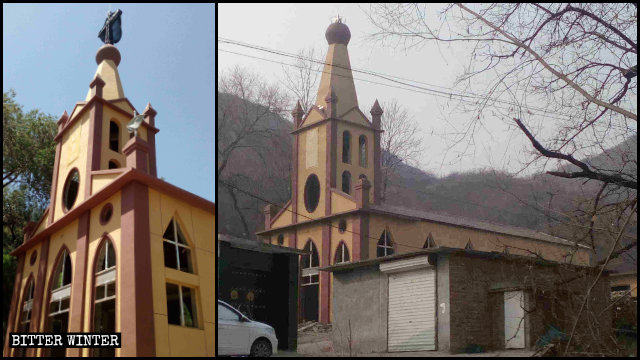
Father Zhang, a 77-year-old priest from the Zhengding Diocese in Shijiazhuang, was repeatedly ordered to return to his hometown for refusing to join the CPCA. Officials threatened to demolish the homes of churchgoers who dared to take in the priest.
In April, the Simencun town government in Botou, a county-level city under Cangzhou city jurisdiction, removed the crosses and the signboard “Catholic Church” from a local Catholic venue.
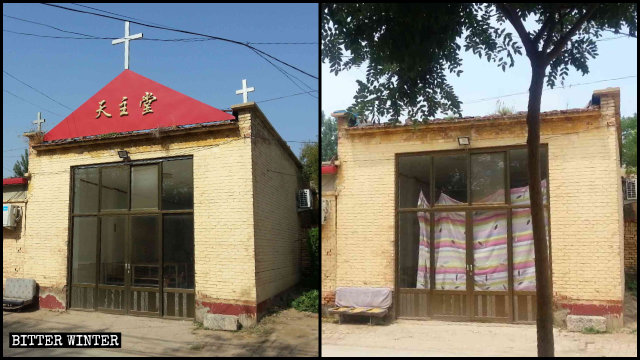
“Under the Xi Jinping rule, campaigns against religion are more important than dealing with floods and other natural disasters,” an unregistered Catholic priest from Hebei told Bitter Winter.
Numerous unregistered Catholic venues were also closed down in Fuzhou city’s Chongren county in the southeastern province of Jiangxi. Local officials threatened to cancel churchgoers’ social welfare allowances and implicate their children if they continue gathering in non-approved religious venues.
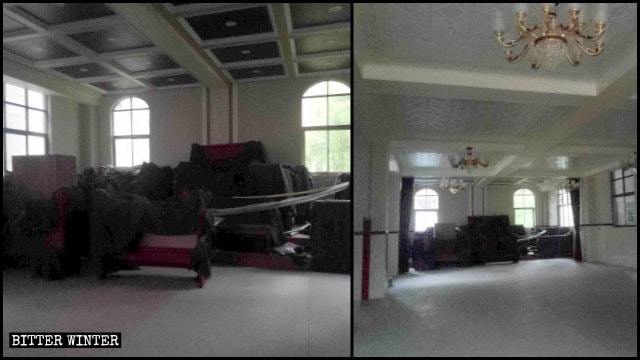
A Catholic priest from the northwestern province of Gansu told Bitter Winter that authorities installed a surveillance camera by the entrance to his unregistered church in February. After he unplugged it, United Front Work Department officials summoned him for questioning and demanded to present them with a list of churchgoers, but he refused. “It reminded me of the Cultural Revolution when the CCP arrested people of faith according to the lists they created,” the priest said.
An unregistered priest from the northern province of Shanxi recalled how he received a call from the police the same day he booked a train ticket online last year, asking him where he was going. “This year, the special police intercepted me twice while I was driving,” the priest added. “They questioned me and said that I was blacklisted. All priests and churchgoers in China are under the CCP’s surveillance.”
On August 15, the Feast of Assumption, the traffic police intercepted about 140 unregistered Catholics from Ningde city in the southeastern province of Fujian. They were on their way to a mass in Fuan city’s Luojiang sub-strict. Officers said they knew where the churchgoers came from and how many buses they had hired for the trip. They fined the bus drivers and withheld their driver’s licenses.
Unregistered Catholics from Jiangxi’s Fengcheng city complained that officials often harassed them and came to their homes to replaced religious symbols and images with portraits of President Xi Jinping. They were even forced to be photographed with these images hanging on the wall. The believers’ neighbors were promised to be financially awarded if they reported any unauthorized religious gatherings.
“Officials told us that we are believers in a foreign God and that this is betrayal of our state,” one of the Catholics said.
In 2018, the Xinyang city government in the central province of Henan threatened to cancel poverty alleviation allowances for a Catholic couple in their 70s if they continued practicing their faith. After they finally signed the statement renouncing their beliefs, officials removed religious images in their home and replaced them with a Mao Zedong portrait.
State-run Catholic churches are also increasingly suppressed.
On August 18, the Handan city government in Hebei Province demolished a Catholic church in a village of the Yongnian district for “being unlicensed,” even though it had a valid religious activity venue registration certificate. A local official told the congregation that “the certificate is merely a piece of paper.” He also threatened the churchgoers guarding the church who came from surrounding villages that their churches would also be demolished because they came here.
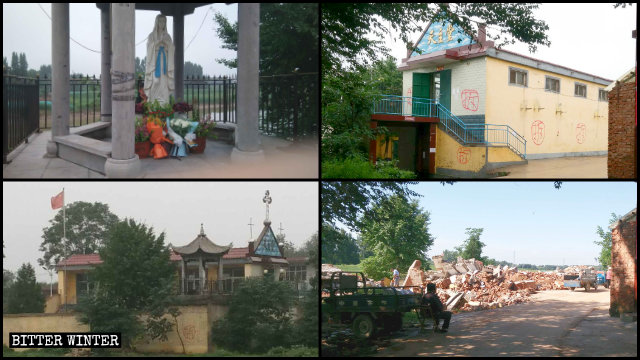
In Longnan county, administered by Jiangxi’s Ganzhou city, United Front Work Department officials inspected a Patriotic Catholic Church on November 1 and ordered to burn all the books printed by state-unapproved publishing houses.
On September 22, crosses were removed from a registered Catholic church in Huizhou city’s Huiyang district in the southern province of Guangdong.
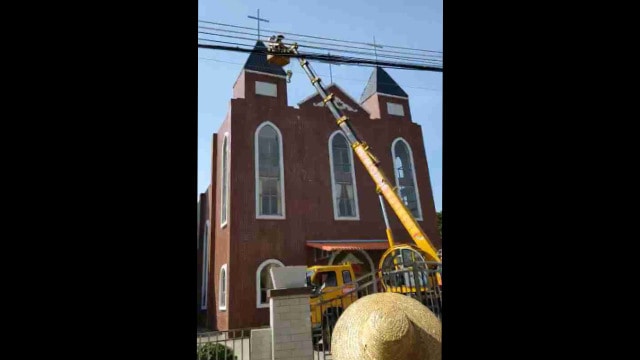
The Yinyao Catholic Church in Puyang county in Henan had its crosses toppled in August. A local official told the congregation that he would be dismissed, and the church would be shut down if the crosses were not removed.
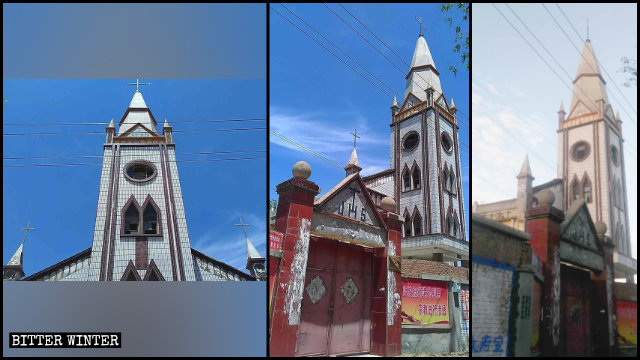
Source: Bitter Winter












